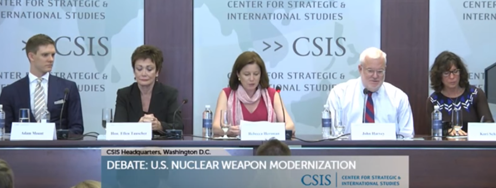Defense Hawks Spar on Nuclear Cuts
You can tell the conversation in Washington is changed when defense hawks argue we should cut the nuclear arsenal and use the funds elsewhere. That is exactly what happened last week on the floor of the House.
Rep. Norman Dicks (D-WA) is a strong supporter of national defense. He is Ranking Member of the House Appropriations Committee and has served on the Subcommittee on Defense for 34 years. He is a forceful speaker on these issues.
Last Thursday, Rep. Dicks stood to oppose an amendment to the Defense Appropriations Bill, offered by Rep. Michael Turner (R-OH), that would block nuclear reductions - even those agreed to under the New START treaty.
As I wrote at Huffington Post, Rep. Dicks opposed more than the amendment. He opposed the idea behind it. In doing so, he took a strong stand on what security means for the 21st century and argued that, to afford it, we should cut the nuclear arsenal.
The rebuttal to Rep. Dicks' statement showcases what Rep. Ed Markey (D-MA) called the “curious disconnect between the reality of the world that we live in today and the understandable but erroneous commitment a relic of a Cold War-era rivalry that no longer can withstand fiscal scrutiny.”
Summaries of the floor debate do not do it justice. I encourage you to read the full transcript below.
-------------
House of Representatives
July 19, 2012
Department of Defense Appropriations Act, 2013
Mr. Dicks. I rise in opposition to this amendment.
The Acting Chair. The gentleman from Washington is recognized for 5 minutes.
Mr. DICKS. As you know, the New START, or strategic arms reduction, is a nuclear arms reduction treaty between the United States and Russia. On December 22, 2010, the Senate increased our national security by providing its advice and consent to ratification of the New START Treaty with Russia. With the New START Treaty, the United States and Russia will have another important element supporting our reset relationship and expanding our bilateral cooperation on a wide range of issues.
As the President said during the end of the last Congress, the treaty is a national security imperative as well as a cornerstone of our relations with Russia. Under the terms of the treaty, the U.S. and Russia will be limited to significantly fewer strategic arms within 7 years from the date the treaty entered into force. Each party has the flexibility to determine for itself the structure of the strategic forces within the aggregate limits of the treaty.
We should carry out our commitment to the New START treaty and not restrict our country's obligation to implement it. I urge my colleagues to oppose the amendment.
I would say to the gentleman, if there is one thing--and I stand here as a member of this subcommittee for 34 years--that we can reduce, it's strategic weapons. We have never used one, except in Hiroshima and Nagasaki. And we can have a credible deterrent with a much smaller force. In fact, I agree with General Cartwright that we could use our strategic ballistic missile submarines and our long-range bombers, the B-2s and hopefully a new bomber, and reduce dramatically the number of land-based ICBMs.
We simply don't need, and we can't afford to have and continue to produce all of these nuclear weapons that will, more than likely, never be used. They are a good deterrent and they have been an effective deterrent. Thank God for that. But the Cold War is over, and we are in a position today where we must reduce the size of our nuclear weapons force.
I yield to the gentleman. I've been here a long time. I went through all the arms control debates, and I know something about this subject.
Mr. TURNER of Ohio. Sir, thank you for yielding me time. And I know you certainly do know about this topic, which is why I know that you also know that we use our nuclear deterrent every day. While we stand on this floor and speak with the freedoms that we have, our nuclear deterrent keeps us safe. Abandoning our nuclear deterrent would not make us safe.
Mr. DICKS. Regaining my time, just for a second, I worked to convert the B-2 bomber from a nuclear weapon carrier to a conventional carrier. Do you know why a conventional bomber is, I think, more of a deterrent than a nuclear bomber? Because with a conventional bomber, you can use bombs. You can go in, and with the JDAMs that we put on those bombers, in one sortie, you could take out 16 targets. That is real deterrence. And that is having a conventional force that is usable.
Nuclear weapons are not going to be used, and that's why both sides can have a much smaller force. We can bring the number of nuclear weapons down. At some point, it becomes ridiculous to have that many warheads when there aren't that many targets, and we're not going to use them.
I know the gentleman is all wrought up about this and protecting our great deterrent, which has been a very valuable thing to our national security. But I have to tell you, if there is one thing that we can reduce by agreement with the Russians, it is nuclear weapons.
I will yield to the gentleman again if he wants to say anything else.
Mr. TURNER of Ohio. To respond to the gentleman, again, our nuclear deterrent is used every day. Every day, it keeps us safe because it ensures that our country----
Mr. DICKS. It isn't used every day. It's available every day.
Mr. TURNER of Ohio. This is my time. The time that I am speaking is my time. You yielded me some and you kept your own.
Mr. DICKS. I yield.
Mr. TURNER of Ohio. The reality is that our nuclear deterrent is used every day. And when you say that nuclear weapons won't be used, you can only say that with respect to our heart, the heart of this country, the heart of this country that wants to make certain that freedom is safe and our allies are safe.
We can't say that for others. Iran and North Korea are pursuing nuclear weapons not because they just want the increased power, they want that technology. They want that ability to have weapons of mass destruction.
Mr. DICKS. I reclaim my time.
The Acting CHAIR. The time of the gentleman from Washington has expired. (By unanimous consent, Mr. Dicks was allowed to proceed for 1 additional minute.)
Mr. DICKS. You don't need thousands of these weapons. A couple hundred, frankly, could take out Iran and almost any country you can imagine. So, again, we can't afford to do everything. We are in an era where we're dealing with terrorists, and we need to have special forces that can be utilized. We need to have these very effective drones. We need to look at the threats that are out there today and equip our military accordingly.
This is not our responsibility. The Senate handles advice and consent on treaties. We should stay out of this. In my judgment, this amendment is unnecessary.
I yield back the balance of my time.




